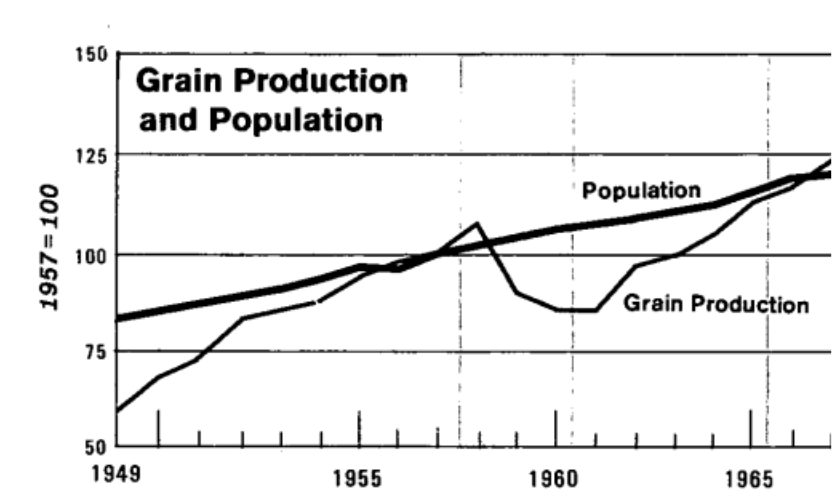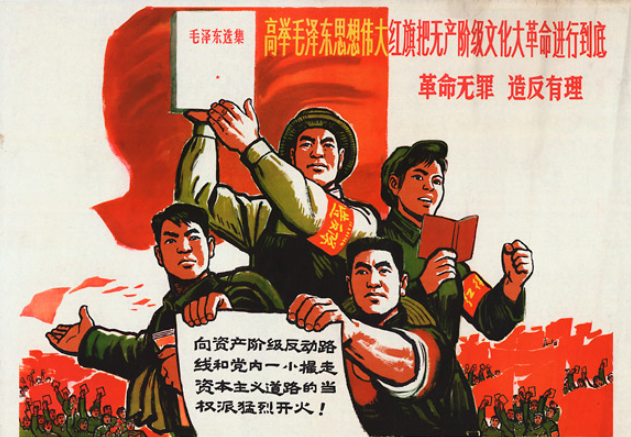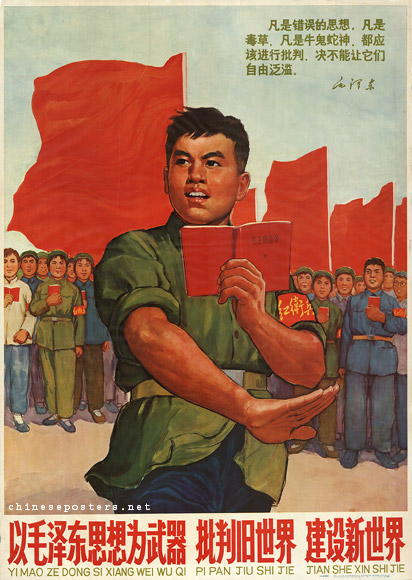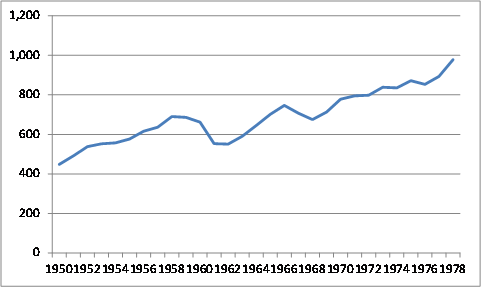
“China: Basic Trends,” Joint Economic Committee of US Congress, 1975

"Hold high the great red banner of Mao Zedong to wage the Great Proletarian Cultural Revolution to the end - Revolution is no crime, to rebel is justified", 1966, Revolutionary Rebel Command of the Shanghai Publishing System
"Crush those persons in authority who are taking the capitalist road..." -The Sixteen Points, 1966

“China: Basic Trends,” Joint Economic Committee of US Congress, 1975
China's population, grain reserves and the natural sparrow populations all rebounded within five years following the famine. However, due to the famine resulting from his failed policies Mao further lost political power as well as the confidence of his people. In an attempt to regain his political control, Mao instituted the Cultural Revolution in 1966.
"The Cultural Revolution was a bloody purge to increase Mao’s personal power.” -historian Jung Chang, 1992
Mao used The Red Guard to rid China of capitalist forces by targeting intellectuals and bourgeoisie, silencing any that did not accept his beliefs. He also purged all other cultures, beliefs, and religions; Ten years of chaos ensued which caused the death of 45 million people. Mao’s crusade for power, including the Cultural Revolution, ended with his untimely death.

"Criticize the old world and build a new world with Mao Zedong Thought as a weapon," 1966, Propaganda Poster Group Shanghai renmin meishu chubanshe (上海人民美术出版社宣传画组)
"Overthrow Peng Dehuai, Luo Ruiqing, Chen Zaidao, Liao Laotan!", 1967, unknown (佚名)
"The 3 July and 24 July proclamations are Chairman Mao's great strategic plans! Unite with forces that can be united with to strike surely, accurately and relentlessly at the handful of class enemies," 1968, unknown (佚名)
In the years following Mao's death in 1978, China fell under new leadership every few years. This series of leaders brought China out from severe poverty into a successful market economy.

"China's GDP per capita," 2008, Angus Maddison
Though China is now competitive in the global market, free speech is still oppressed. It remains taboo to speak of the great famine in China, referred to instead as the “Three Bad Years” or the “Three Years of Difficulties”. This lack of free speech makes it difficult to apply lessons from past mistakes to future situations.
"Our history is all fabricated. It's been covered up. If a country can't face its own history, then it has no future." - Chinese journalist Yang Jisheng, 2014
Today, Patriotic Health Campaigns have remained an important staple in Chinese government due to the infrastructure established during the 1950s campaigns. In 2002, an anti-SARS campaign brought back Maoist era propaganda and mobilization of the citizenry in a war against the disease. Civet cats were slaughtered and strict sanitation standards were enforced. This willingness to take extreme measures against nature to protect public health is reminiscent of Mao’s Four Pests campaign, ingrained in today's government policies.
“China kills 10,000 civet cats in “patriotic” campaign against SARS” -The BMJ, 2004
Personal interview with expert Mary Brazelton, 2020
"Be fond of health, fight against "SARS" - hold on ... to the last victory!", 2003, unknown (佚名)
While the Four Pests campaign set a new standard of prioritizing Chinese public health, the ecological barrier Mao broke had disastrous cultural, political, and economic effects. Mao’s legacy is an example of a chain reaction of events caused by breaking barriers in nature, challenging the natural law.
"Ren ding shengtian" (Man Must Conquer Nature) -Mao Zedong, 1957